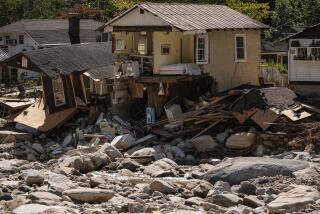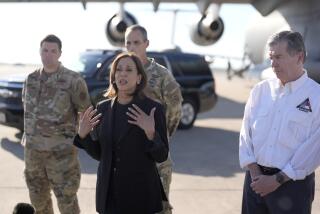Bush Defends U.S. Response to Disaster
- Share via
WASHINGTON — President Bush launched an aggressive defense Wednesday of his administration’s response to the southern Asian tsunami disaster, calling critics “ill-informed” and predicting that U.S. aid ultimately would surpass the $35 million in initial cash assistance.
“We’re a very generous, kindhearted nation,” said Bush, vacationing on his ranch near Crawford, Texas. “What you’re beginning to see is a typical response from America.”
Bush said that the tsunami had “brought loss and grief to the world that is beyond our comprehension,” and pledged that the U.S. would “stand with the affected governments as they care for the victims.”
The president’s remarks came amid assurances from administration officials that the U.S. response would include a substantial deployment of ships and military personnel. He also announced the formation of a four-nation bloc to coordinate relief efforts and telephoned the leaders of the hardest-hit countries.
The announcements marked an apparent shift in public relations strategy as White House officials sought to rehabilitate the administration’s image amid criticism that the U.S. was not offering enough assistance and that Bush personally was slow to respond.
U.S. officials initially pledged $15 million. But the administration upped that to $35 million Tuesday, after a United Nations official was quoted calling the U.S. and other wealthy nations “stingy” when it came to aid.
The president’s appearance Wednesday was his first since the tsunami struck Sunday. Bush’s public comments came a day after a White House spokesman deflected questions about why the vacationing president, devoting much of his time to bicycling and clearing brush, had not been more assertive in the wake of such a massive tragedy.
Allies and critics of Bush said Wednesday that the administration had bungled its response to the tragedy, missing a chance to display goodwill at a time when the country was facing opposition abroad to the war in Iraq. Much of that opposition comes from the Muslim world, and several of the countries hit by the tsunami have large Muslim populations.
“This was a golden opportunity for President Bush to speak to the victims of the tsunami and the Muslim world by showing care and compassion,” said David L. Phillips, a former senior advisor to the State Department under Bush and President Clinton and now a senior fellow at the Council on Foreign Relations. “Instead the U.S. is on the defensive, trying to explain its approach.”
Sen. Sam Brownback (R-Kan.), a leading proponent of increasing foreign aid and an administration ally, said officials had erred in their early response by citing the $15-million figure.
“I don’t know that I would have put out the initial figure, since looking at this, you know that it’s going to go up substantially,” Brownback said.
The senator attributed the mistake to uncertainty within the administration as Secretary of State Colin L. Powell prepared to leave and national security advisor Condoleezza Rice readied to replace him. Also, many officials are on vacation. “There’s just not the level of communication you would normally have on something like this,” Brownback said.
He called on the administration Wednesday to send a high-ranking emissary to the region to show solidarity.
Bush announced that the U.S. -- with India, Japan and Australia -- had formed a “core group” of nations to coordinate disaster relief. He said he had expressed condolences in telephone calls to the leaders of India, Sri Lanka, Thailand and Indonesia.
It was not immediately clear how the group would work with the U.N. and other international organizations that typically coordinate relief efforts.
At the same time, Pentagon officials announced plans for what appeared to be an unusually large military response to the disaster.
The Pentagon will send a Navy aircraft carrier strike group to the Indonesian coast and a Marine expeditionary strike group to the Bay of Bengal. One official at the U.S. Pacific Command said the task force totaled about 20,000 military personnel, dwarfing that of previous U.S. military efforts to aid disaster victims.
“In my memory, this is the largest disaster relief effort the U.S. military has undertaken,” said Maj. Guillermo Canedo, a spokesman for Pacific Command, whose area of responsibility included the affected region.
The task force also brings with it seven Marine cargo ships that are capable of producing 90,000 gallons of fresh water daily. An eighth cargo ship has a 500-bed floating hospital.
The Pentagon said the aircraft carrier group, coming from Hong Kong, could reach the Indonesian coast by this weekend. The Marine strike group, coming from Guam, could take up to 10 days to arrive.
Bush said the cost of the military response was not necessarily included in the total being cited by critics.
“It takes money, by the way, to move an expeditionary force into the region,” he said. “In other words, we’re diverting assets, which is part of our overall aid package. We’ll continue to provide assets.”
Both Bush and State Department officials were adamant that the U.S. response was appropriate.
The president noted that the U.S. had provided $2.4 billion in aid during 2004 -- about 40% of all foreign aid worldwide.
Andrew S. Natsios, administrator of the U.S. Agency for International Development, credited Bush with boosting aid levels.
“So we have been generous for a long time,” Natsios said. “We’re the leaders. We have been. We will continue to be.”
Asked why it took the government four days to mount an aggressive response, Natsios insisted that the reaction to the tsunami was swift.
*
Wallsten reported from Washington and Chen from Crawford. Times staff writers Mark Mazzetti and Paul Richter in Washington and Maggie Farley at the United Nations contributed to this report.
More to Read
Get the L.A. Times Politics newsletter
Deeply reported insights into legislation, politics and policy from Sacramento, Washington and beyond. In your inbox three times per week.
You may occasionally receive promotional content from the Los Angeles Times.










